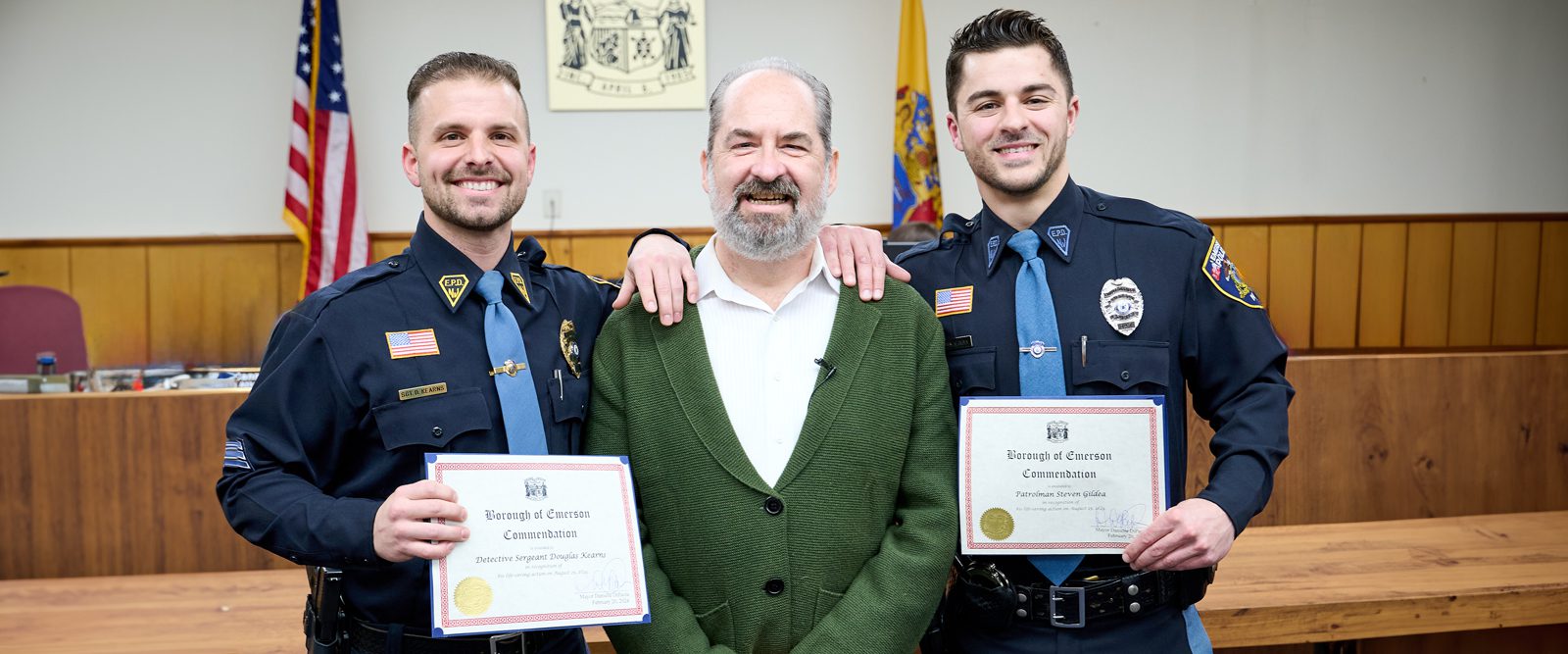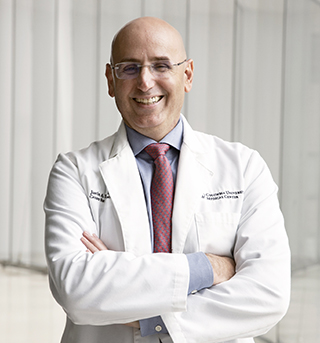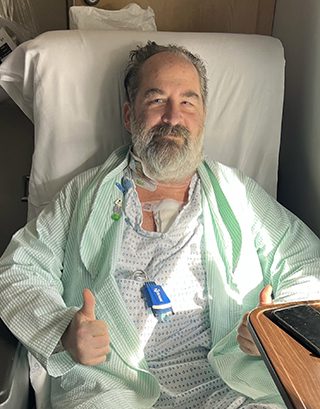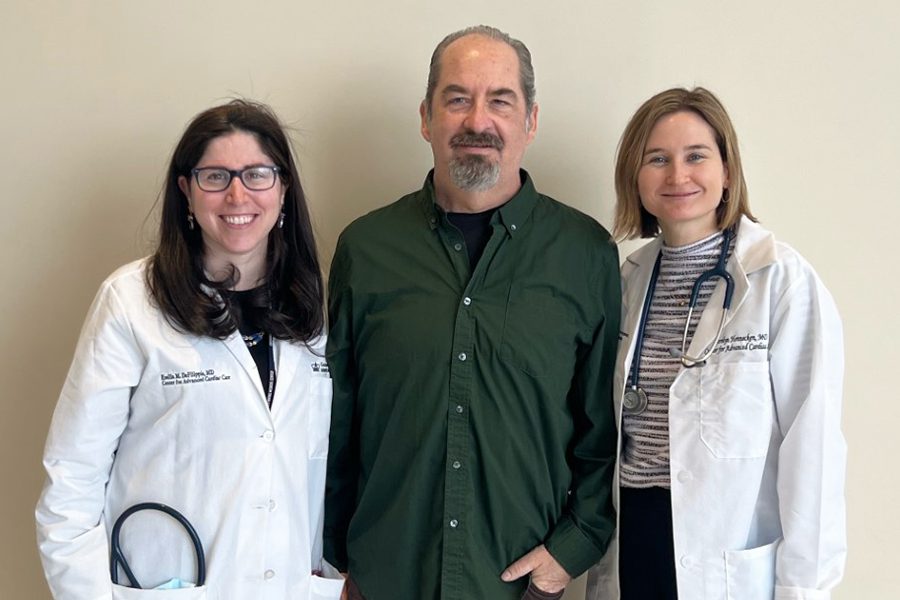‘The First of Many Miracles’
A local New Jersey town celebrates the first responders who saved Tim Gmahle’s life after a cardiac arrest and the NewYork-Presbyerian care team who gave him a second chance at life with a transplant.

The borough of Emerson, New Jersey honored Detective Sergeant Douglas Kearns (left), Patrolman Stephen Gildea (right), and NewYork-Presbyterian staff with a formal commendation for their lifesaving efforts after patient Tim Gmahle's (center) cardiac arrest.
Tim Gmahle received an unforgettable gift for his 55th birthday: a chance to honor the police officers who helped save his life during a cardiac emergency and the NewYork-Presbyterian care team who performed his heart transplant.
Surrounded by their loved ones, Tim and his wife, Kate Featherstone, wiped away tears as they looked out into a crowded room of family, friends and children holding hand-drawn signs with colorful hearts reading, “Thank You!” and “We Love Mr. Tim!”
Thanks to the quick action of the Emerson Police Department in August 2023, Tim was able to recover from a cardiac arrest and receive a lifesaving heart transplant at NewYork-Presbyterian/Columbia University Irving Medical Center. “Without their decisive thinking and quick action, I wouldn’t be here,” Tim says of the first responders. “We’ve had brilliant, amazing medical professionals, but without those officers, none of that would’ve happened.”

Dr. Nir Uriel
During a special borough ceremony during in February 2024, Tim and his family extended their gratitude to the two officers who provided CPR when he suffered a heart attack in his New Jersey home. Emerson Mayor Danielle DiPaola honored Patrolman Stephen Gildea and Detective Sergeant Douglas Kearns with a formal commendation. Tim’s NewYork-Presbyterian care team, including Dr. Nir Uriel, Director of Advanced Heart Failure, Cardiac Transplantation and Mechanical Circulatory Support at NewYork-Presbyterian, also received a commendation from the borough for their lifesaving dedication.
“It’s a good feeling to know that Tim can continue with his days and be in his child’s life,” Patrolman Gildea says. “When you ask any police officer why they took this job, it’s because we wanted to help people. This is the best possible outcome you can have.”
“There aren’t enough words to say thank you. I used to always say I’m lucky, but I don’t even like to use that term anymore,” Tim says. “I experienced so many miracles in these last few months that are immeasurable, from the care of my wife, family and town, to the care from my doctors, but these officers were the first of many miracles.”
A Second Wake-Up Call
With a history of diabetes, high blood pressure and ischemic heart disease — a condition where the heart’s arteries narrow — Tim recovered from an initial heart attack in 2014 and underwent coronary artery bypass graft surgery.
He managed his heart disease with medication and felt good, spending time in his garden and staying active with his dogs and 7-year-old son, Timothy.
“My first heart attack was a real wake-up call, and I certainly didn’t expect it to happen a second time,” Tim says.
Tim and Kate were getting ready for a parents’ night out on Aug. 25, 2023, when suddenly, he collapsed onto their bed and suffered cardiac arrest.
“I looked over at him and he was passed out,” Kate says. “No pulse. I was screaming, calling 911, and the officers came right away. They were so calm and took charge while I was praying over and over again, begging him to come back.”
Patrolman Gildea and Detective Sergeant Kearns performed CPR and revived Tim with an automated external defibrillator. Immediately after, first responders rushed him to a local hospital where they stabilized him, then airlifted him to another hospital where he was in an induced coma for more than one week.
"Tim is a testimony to the importance of people in the field like these officers, who recognized a patient in need and have the skillset to resuscitate him."— Dr. Nir Uriel
Only about 40 percent of people who experience a heart attack outside of a hospital get the immediate help that they need, according to the American Heart Association.
“Tim is a testimony to the importance of people in the field like these officers, who recognized a patient in need and have the skillset to resuscitate him,” says Dr. Uriel.
Tim was placed on extracorporeal membrane oxygenation, or ECMO, which is a machine that provides short-term support for a patient’s heart and lungs. Doctors implanted a heart pump to improve its function, but his heart was too weak and wasn’t going to recover. He needed a transplant. That’s when the team at NewYork-Presbyterian/Columbia stepped in to help see him through his recovery.

Tim spent nearly three months at NewYork-Presbyterian/Columbia following his cardiac arrest.
'A Village Full of Heroes'
Upon arrival at NewYork-Presbyterian/Columbia on Sept. 15, 2023, Tim’s ejection fraction, which measures how much blood is pumped out with each heartbeat, was at 10 percent.
The typical, healthy average is around 55 to 60 percent, according to Dr. Uriel.
“It was an emotional rollercoaster for him to go through transplant evaluation, get on the list and wait for a new heart,” says Dr. Uriel, who is also a professor of medicine in the Division of Cardiology at Columbia University Vagelos College of Physicians and Surgeons and an adjunct professor of medicine in the Division of Cardiology at Weill Cornell Medicine.
“But from the nurses to the pharmacists and all the care teams in the Intensive Care Unit, we had the village to take care of Tim, a village full of heroes to make sure that the transplant would be as successful as possible.”
“Right off the bat, the care we got at NewYork-Presbyterian/Columbia was incredible. It was the best place I could have possibly been in,” Tim says. “Dr. Uriel stood out as someone who would put me at ease, which helped give me strength.”
During his nearly three-month stay at NewYork-Presbyterian/Columbia, Tim had frequent visits from friends and family. Back home, their village rallied around Kate and their son, mowing the lawn, delivering meals, and offering support.
“It’s so powerful as a provider to meet a patient’s family and understand why they are fighting so hard for their life,” Dr. Uriel says. “It’s a constant reminder of how fragile life can be. It motivates you even more to help get them to where they need to be.”
As a lover of music, Tim found encouragement in members of his care team who loaned him a guitar to play.
“At times when I would feel low, it would just take one nurse, doctor, physical therapist, or even my EKG technician to have a short conversation with me and revive my fight,’” he says.
On Nov. 14, Tim received the call about an available donor heart. Staff visited his room to wish him good luck as he prepared for transplant surgery, Kate recalls.
“It was a really emotional, amazing moment,” she says.
“When they said how many heart transplants they perform at the hospital, it just blew my mind,” Tim says. “It gave me the confidence to know I could be okay.”

Tim (center) with members of his care team, cardiologists Dr. Ersilia DeFilippis (left) and Dr. Carolyn Hennecken (right).
A Lifetime of Gratitude
Following a month of recovery, Tim was discharged just in time for Christmas.
“It’s very joyful to see patients on the other side,” Dr. Uriel says. “No matter how many transplants I’ve done, I always have tears after the surgery. It’s a reminder that we can help them be back with their family and see their children grow up.”
Tim’s follow-up appointments have decreased from weekly, to bi-weekly, and now monthly.
He’s looking forward to Timothy’s first communion in the spring, and hosting family and friends.
“We have a lot to celebrate,” Kate says. “We’re beyond grateful and we just keep saying thank you. Thank you to the officers, to the hospital, to our community. How do you thank someone for saving a life and saving our family?”
“I wish this incident had never happened, but I feel like I would’ve never gotten to experience that much love in my life. It changed my whole perspective on everything,” Tim says. “I’m fortunate to have seen a bunch of small miracles throughout this that have really woken me up.”
Additional Resources
Learn more about heart transplant services at NewYork-Presbyterian.
Learn about our comprehensive cardiovascular services.
Find out more on heart failure care from world-class providers.

